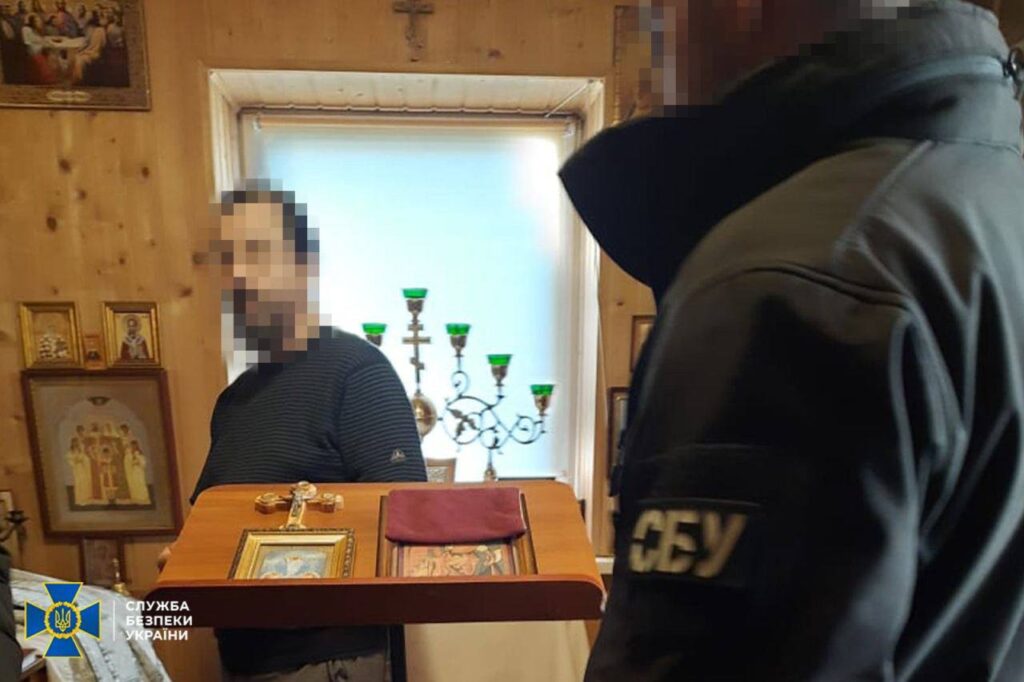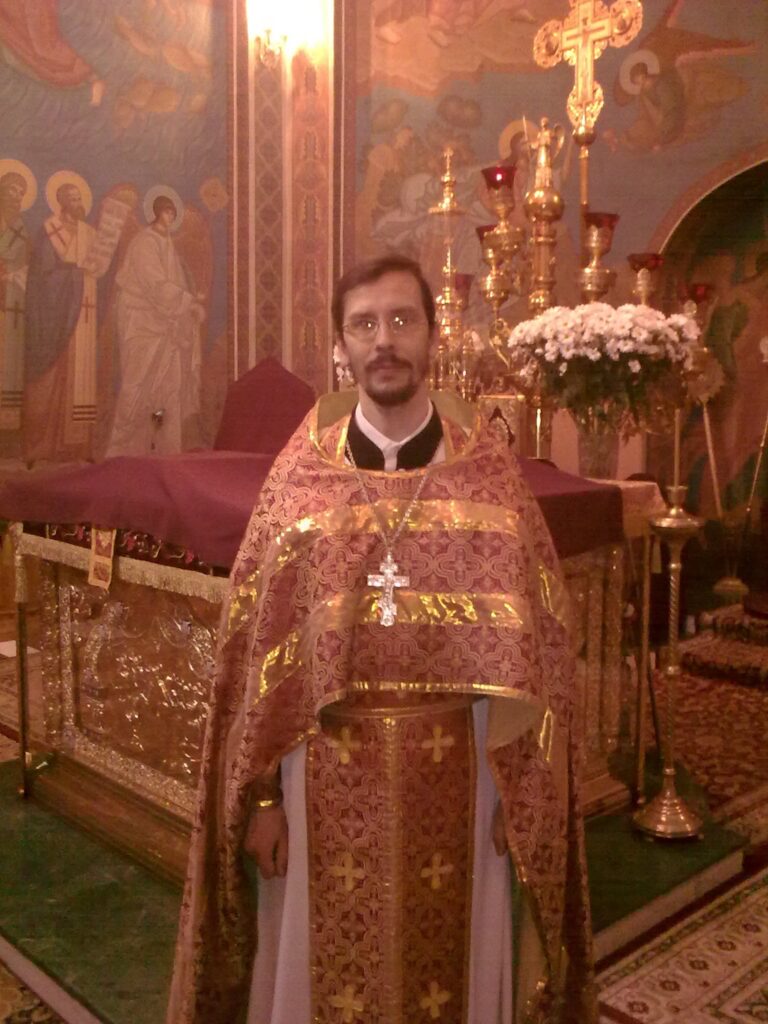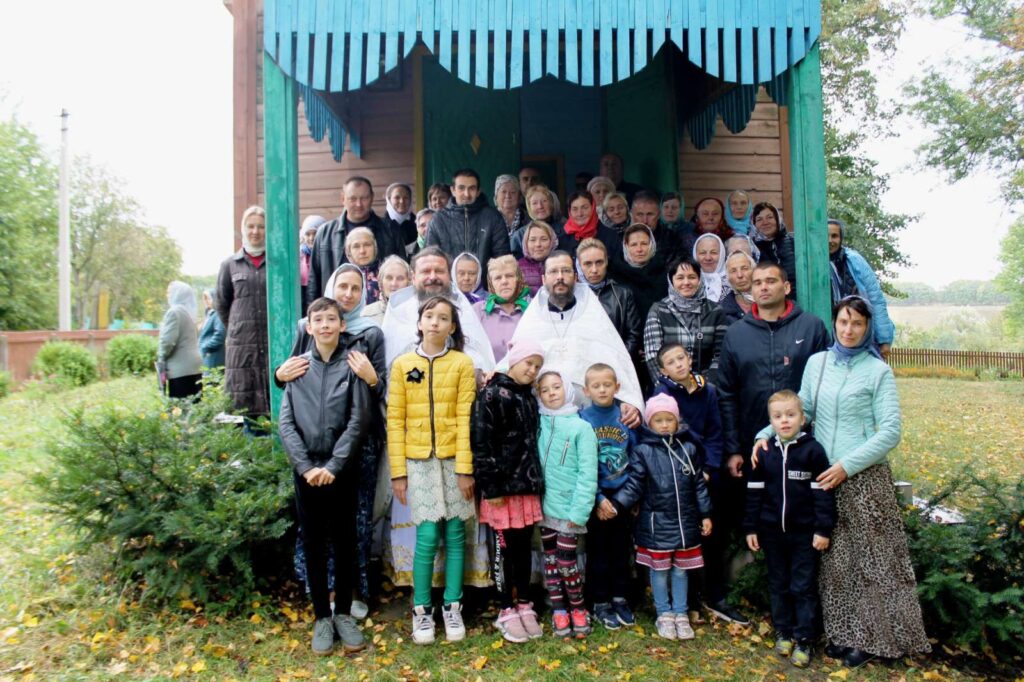Archpriest Dmitry Tikhov was born in Ivano-Frankivsk and served as a clergyman in the Vinnytsia diocese of the Ukrainian Orthodox Church (UOC). A father of three, he served in a Russian Orthodox Church (ROC) in the Penza region of Russia from 2016, his father’s homeland. He later returned home and, from 2021, served as the rector of a church. He was awarded certificates of merit by the UOC.
After the war began, in May 2022, Tikhov was removed as rector and left as an out-of-staff clergyman with the right to transfer to another diocese. Having lost his parishioners, Dmitry began conducting home prayer services for his family and expressing his opinions on various events online – in a Telegram group he created with 4-5 members, including his wife and several former parishioners, and on his VKontakte social media page.
It all culminated in October 2023 when Tikhov was summoned to the SBU (Security Service of Ukraine) investigator, but he did not appear. A notification of suspicion under two articles (Part 2, Article 109 – calls for the overthrow of state power, and Part 2, Article 436-2 – justification of Russian aggression) was given to his wife.
The SBU press service stated that the archpriest refused to perform a funeral service for a deceased Ukrainian soldier, referred to the current war as a civil war in his Telegram channel, glorified Alexander Zakharchenko, Givi, and Motorola, “justified the seizure of Ukrainian territories,” and published “anti-Ukrainian religious messages.”
The priest was at large for over 10 days before his arrest in the village of Pultovtsy, Vinnytsia Oblast.

On November 20, 2023, Tikhov was remanded in custody at the Vinnytsia pre-trial detention center, but released on bail of 215,000 hryvnias on December 28. Cases related to national security are not typically released on bail, especially so quickly, unless the alleged crime is very minor. Indeed, despite the SBU press service’s strong statements, the charges against the archpriest carry a maximum sentence of 5 years. The actual indictment does not include the refusal to perform a funeral service for a Ukrainian soldier, the glorification of Zakharchenko, Givi, and Motorola, or statements about a civil war. The indictment cites exactly two messages Tikhov posted on Telegram and VKontakte.
Regarding the first post, the investigation and prosecution wrote the following:
“In the Telegram messenger, Tikhov created a community called ‘Parish of the Holy Royal Martyrs and Blessed Matrona of Moscow,’ inviting close friends and acquaintances. Tikhov used this community to disseminate anti-Ukrainian religious and propaganda content, including materials calling for the violent change, overthrow of the constitutional order, and seizure of state power, as well as denying the armed aggression of the Russian Federation, including by portraying Russia’s armed aggression against Ukraine as an internal civil conflict.”
The Criminal Code does not recognize the concepts of “anti-Ukrainian” or “pro-Ukrainian.” These are purely subjective assessments. The same applies to the community’s name, which includes the word “Moscow,” which likely automatically implies that Tikhov is a Kremlin agent. In reality, the community’s name is simply the name of the church holiday on which Tikhov was ordained a priest – the day of his ordination.

On August 22, 2022, Tikhov reposted a message that began:
“Today our Fatherland, Rus’, historical Rus’, is undergoing severe trials. We know what is happening in Ukraine…”
Clearly, there are no calls to action in this text. It is also unclear what constitutes the “justification of Russian aggression.” Tikhov, “continuing his criminal intent,” reposted this message on his VKontakte page. On August 24, he wrote:
“The statement that the UOC had no connection to the Moscow Patriarchate is the height of the lies that began with timid references to the fact that in the registration documents of the Ministry of Justice, the UOC was registered without the MP prefix…”
As can be seen, this post contains no calls to action and says nothing about the war – whether aggressive, civil, or any other kind. However, a linguistic expert concluded that Tikhov “intentionally, pursuing anti-Ukrainian ideological motives, used his VKontakte page, including for the purpose of committing crimes.” A linguist has no right to make legal conclusions, but he did. On September 8, 2023, he stated that the materials contained public calls “in an indirect form” to the violent overthrow of the constitutional order and the seizure of state power. What is an “indirect form” call to action?
The accused admitted to posting these messages, and this proved sufficient for the court to record a guilty plea. However, Tikhov did not plead guilty to committing a crime. Moreover, he stated that he had no idea his actions could violate any law.
He was asked (although this is irrelevant to the case) if he remembered Patriarch Kirill in his prayers. Firstly, this is a matter of freedom of conscience – a secular court cannot interfere in intra-religious matters. Secondly, Tikhov did not serve in a church, and who he remembered in his family circle is his private affair. The archpriest replied that he could not say anything to the court on this matter, as prayer is an intimate act. The questions did not end there. Whether Tikhov prayed “for the Russian world” was also of great interest to the prosecutor, although this is also irrelevant to the subject of proof within the framework of the indictment. Tikhov replied that he did not, as he is convinced that prayer is not related to politics.

In essence, he stated that there was no discussion of his posts, he did not intend to influence anyone (and who could he influence, with only 4-5 close people on Telegram and barely 20 subscribers on VKontakte?), and simply wanted to know people’s opinions on issues that concerned him. Tikhov created his VKontakte page long before the war; his friends there are mostly from Russia, as he served in a church in the Penza region for some time. He is not even sure if anyone from Ukraine is among them; that is, there was simply no one to influence.
Given all the circumstances, the lawyer requested a suspended sentence for Tikhov (if the charge carries a maximum of 5 years, this is possible). But the prosecutor disagreed. Yes, the priest pleaded guilty (admitted to writing the messages, but did not confess to any crime), but the “crime” was committed during the active phase of the war. the accused was in hiding, so in fact he did not repent and does not regret what he had done. Most likely, yes, he did not repent, because there is nothing to repent of, but after all, “he had his own parish,” “worked as a priest in the Russian Federation,” which means “he has a clear pro-Russian position”.
The logic presented was: past work in Russia implies a pro-Russian stance, a pro-Russian stance implies guilt, despite the apparent absence of any actual crime. Furthermore, they noted that Tikhon hadn’t had a parish for a long time, only his family.
The court decided that examining the evidence was unnecessary – everything was supposedly clear, especially since the defendant had pleaded guilty (which, in reality, he hadn’t).
In late January 2024, Archpriest Dmitry Tikhon was sentenced to two years in prison for indirectly inciting the overthrow of the government. The “incitement” consisted of the words: “Russia is undergoing severe trials,” and the court did not examine any evidence before reaching its verdict.
This translation was made using a neural network. If you find any inaccuracies, please contact us.


